Don Clinchy's blog
DVD Review: The Messenger
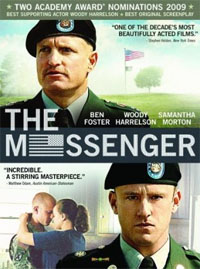 For much of the last decade, most films about the wars in Iraq and Afghanistan failed to find audiences or garner much critical praise. From The Situation to Home of the Brave to Stop Loss, war-related films usually opened to tepid reviews and disappeared with little notice. As America's two wars dragged on, filmgoers showed little interest in seeing the carnage at their local multiplex, and critics dismissed most of the films as clichéd or unrealistic.
For much of the last decade, most films about the wars in Iraq and Afghanistan failed to find audiences or garner much critical praise. From The Situation to Home of the Brave to Stop Loss, war-related films usually opened to tepid reviews and disappeared with little notice. As America's two wars dragged on, filmgoers showed little interest in seeing the carnage at their local multiplex, and critics dismissed most of the films as clichéd or unrealistic.
And then, of course, The Hurt Locker changed everything. A brilliant multi-Oscar winner and solid box office success, Kathryn Bigelow's harrowing tale of an Army bomb squad proved that an exceptionally well made Iraq war film could indeed satisfy critics and audiences.
Unfortunately, somewhat lost in the glare of Oscar-season hype surrounding The Hurt Locker was another glowingly reviewed, Oscar-nominated, must-see Iraq war film released late last year -- The Messenger, available today on DVD and Blu-ray. Directed and co-written by Oren Moverman, the film first screened locally during Austin Film Festival in 2009.
A rawly emotional and yet thoughtful story, The Messenger follows two Army officers assigned to what is perhaps the military's toughest duty: casualty notification. It is their mostly thankless job to tell the next of kin, face to face, that their loved ones have been killed.
The younger of the two officers is Staff Sergeant Will Montgomery (Ben Foster), freshly returned from a tour in Iraq and still recovering from serious injuries from a bomb blast. With only a few months left in his enlistment, Montgomery is understandably unhappy with his final duty assignment. He also takes an immediate dislike to his new partner and mentor, Captain Tony Stone (Woody Harrelson), a career soldier whose by-the-book mentality and emotional detachment make Montgomery's job all the more unpleasant.
Review: The Secret in Their Eyes
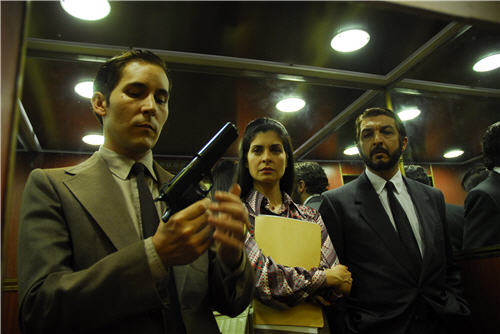
It's little wonder that the stunning crime thriller The Secret in Their Eyes (El secreto de sus ojos) won the 2010 Academy Award for Best Foreign Language Film. The Argentine import, opening Friday at the Arbor, is all at once lyrical, brutal, poignant and provocative, an intimate and personal journey with much broader implications about the nature of justice.
Equal parts police procedural, psychological thriller and love story, The Secret in Their Eyes is the story of recently retired criminal investigator Benjamín Esposito (Ricardo Darín), who in 1999 decides to write a novel based on a 25-year-old rape and murder case that still haunts him. The story is told largely in flashbacks to 1974, following Esposito and his colleagues as they investigate the crime.
Like many horrific crimes, the murder claims many victims beyond Liliana Coleto (Carla Quevedo), the young woman who is brutalized and killed. Her husband, Ricardo Morales (Pablo Rago), lives with long-term grief and emptiness that drive him to irrational behavior; for months, he deludes himself into thinking he'll find the killer by waiting for him every day in a train station. Esposito and his alcoholic partner, Pablo Sandoval (Guillermo Francella), may be hardened cops, but they develop an obsession with the case that jeopardizes their careers as they break rules to find evidence and clash with superiors to keep the case open.
Review: A Surprise in Texas

The story of Nobuyuki Tsujii is truly inspiring. Blind since birth, the Japanese classical pianist has not let his disability prevent him from becoming a renowned musician who has won accolades the world over for his amazing talent.
The new documentary A Surprise in Texas chronicles Tsujii's stellar performances at the 2009 Van Cliburn International Piano Competition in Fort Worth, Texas, one of the world's most prestigious musical competitions. The film, which opens Friday at the Arbor, follows Tsujii and a half-dozen other young competitors during the grueling three-week event. Produced and directed by veteran documentarian Peter Rosen for the Van Cliburn Foundation, A Surprise in Texas is a pleasant enough peek into the world of the Van Cliburn competition. But while it captures the power of the concert performances, it's far less successful at humanizing most of the performers or turning a compelling subject into a compelling film.
DVD Review: Beeswax
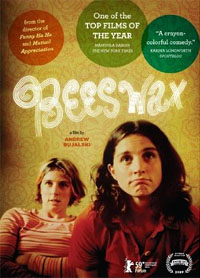 I've been a fan of mumblecore films since the genre arose in the early 2000s. While they are works of fiction, these low-budget, talky, relationship-centric films are often uncannily realistic. The charm of mumblecore is that the characters are everyday people who encounter everyday situations; they could be our friends and family members, and their stories could be our stories.
I've been a fan of mumblecore films since the genre arose in the early 2000s. While they are works of fiction, these low-budget, talky, relationship-centric films are often uncannily realistic. The charm of mumblecore is that the characters are everyday people who encounter everyday situations; they could be our friends and family members, and their stories could be our stories.
The 2009 film Beeswax, the third feature from filmmaker Andrew Bujalski, is an exceptional example of the genre. Now available on DVD, Beeswax is the antitheses of mainstream filmmaking. A slow-paced, narrowly focused, mostly plotless examination of human relationships, it has nary a Hollywood-glamorous character, formulaic romance or action sequence. Beeswax focuses on the ordinary -- but it does so with such skillful attention to detail that the film is in many ways extraordinary.
Bear with me while I describe what passes for the plot of Beeswax. The film follows two twentysomething twin sisters, Jeannie and Lauren, played by real-life twins Tilly and Maggie Hatcher. Jeannie, a paraplegic since childhood who uses a wheelchair, is co-owner of an Austin vintage clothing store, while Lauren is between jobs and considering teaching English overseas. Tensions mount between Jeannie and her business partner, Amanda (Anne Dodge), as their management styles conflict and communication problems cause repeated clashes between the two. When Amanda hints that the conflict may give rise to a lawsuit, a panicked Jeannie enlists help from her ex-boyfriend, Merrill (Alex Karpovsky), a recent law-school graduate who is studying for the bar exam. In true mumblecore fashion, the two reluctantly meet to discuss the lawsuit but end up in bed together, as if to avoid dealing with the problem for at least one night.
DVD Review: Bad Lieutenant: Port of Call New Orleans
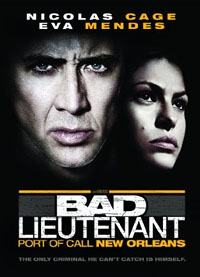 The film Bad Lieutenant: Port of Call New Orleans is an odd but effective take on police corruption and the horrors of drug addiction. The film, now available on DVD and Blu-ray, combines a standard police procedural with elements of quirky, drug-fueled surrealism in a dark commentary about the fine -- and often blurred -- line between police work and criminal behavior.
The film Bad Lieutenant: Port of Call New Orleans is an odd but effective take on police corruption and the horrors of drug addiction. The film, now available on DVD and Blu-ray, combines a standard police procedural with elements of quirky, drug-fueled surrealism in a dark commentary about the fine -- and often blurred -- line between police work and criminal behavior.
Set in post-Katrina New Orleans, the story follows Terence McDonagh (Nicolas Cage), a New Orleans police sergeant who injures his back while trying to rescue an inmate from a flooded jail cell. McDonagh is promoted to lieutenant for his heroism, but along with the promotion comes the prospect of a lifetime of debilitating back pain.
Six months after his promotion, McDonagh is assigned to investigate the execution-style murders of five Senegalese immigrants. By this time, he's already deeply addicted to painkillers, supplementing his prescriptions with OxyContin, cocaine and whatever else he can pilfer from the evidence room or score from suspects he detains. But McDonagh's substance abuse is only one of his problems; when not hustling his next fix, he's begging his bookie (Brad Dourif) to loan him enough money for just one more bet or paying a visit to his equally drug-addled girlfriend, Frankie (Eva Mendes), a high-dollar prostitute.
As McDonagh leads the murder investigation, it's obvious that he's a very skilled cop. But his true talent seems to lie in complicating his own life. As his gambling debts mount, he goes to extreme lengths to pay them off. He has a run-in with one of Frankie's johns, an abusive but wealthy and well connected thug who vows to get revenge when McDonagh steals his money. McDonagh also takes his rogue-cop interrogation methods way too far, and soon both his job and his life are in jeopardy.
Review: The Yellow Handkerchief
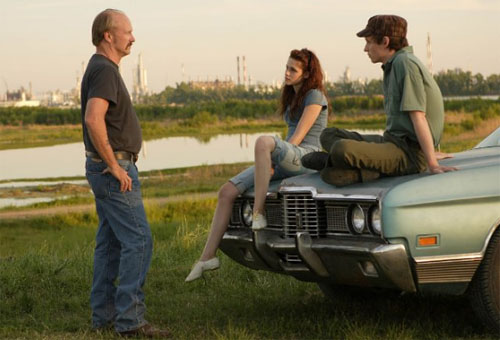
Feelings of loneliness and detachment usually isolate people from the world around them. But these feelings also can bring lonely souls together, bonding them with a shared sense of separation from their families and friends.
This paradoxical notion that separation can unite people is the central theme of The Yellow Handkerchief, a quietly intense film about three disparate strangers who generally trust no one but learn to trust each other while on a road trip through Louisiana. Smartly written, beautifully filmed and powerfully acted, The Yellow Handkerchief opens in Austin at the Arbor on Friday.
The story opens as Brett Hanson (William Hurt), newly paroled after six years in prison, wanders into a rural Louisiana town with a lot of emotional baggage and no idea where life will take him next. He meets awkward, lovelorn teen Gordy (Eddie Redmayne) and sullen teen beauty Martine (Kristen Stewart) after witnessing Gordy's inept and predictably disastrous attempt to impress the girl.
DVD Review: Fantastic Mr. Fox
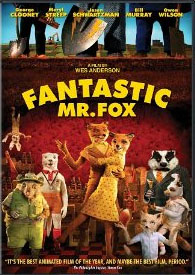 The movie Fantastic Mr. Fox is director Wes Anderson's first animated film, and Anderson's uniquely skewed sensibilities work well in the film's stop-action animated universe. From its snarky dialogue to its catchy vintage pop soundtrack, the film shares many Anderson hallmarks with the director's much-loved other films such as Bottle Rocket and The Royal Tenenbaums.
The movie Fantastic Mr. Fox is director Wes Anderson's first animated film, and Anderson's uniquely skewed sensibilities work well in the film's stop-action animated universe. From its snarky dialogue to its catchy vintage pop soundtrack, the film shares many Anderson hallmarks with the director's much-loved other films such as Bottle Rocket and The Royal Tenenbaums.
Based on the Roald Dahl children's novel, Fantastic Mr. Fox -- now available on DVD and Blu-ray -- is not a complicated story. Mr. Fox (George Clooney), who has a penchant for daring squab thefts and other nocturnal adventures, promises to give up his reckless ways when his wife, Felicity (Meryl Streep), announces that she's pregnant. He keeps his promise for a couple of years, settling into a life of responsible parenthood with Mrs. Fox and their growing son, Ash (Jason Schwartzman).
All is mostly well until the Foxes move from their cozy den into a better home in the base of a tree near land owned by notoriously mean farmers Boggis, Bunce and Bean, (Robin Hurlstone, Hugo Guinness and Michael Gambon, respectively). The Foxes' smart and athletically talented nephew Kristofferson (Eric Chase Anderson) moves in with the family, creating tension with a very jealous Ash. And tempted by the many treasures on the nearby farms, Mr. Fox soon is back to his thieving ways, making daring raids with help from his building superintendent, a somewhat dense opossum named Kylie (Wallace Wolodarsky).
Blu-ray Review: Days of Heaven
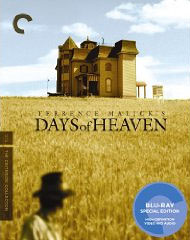 No one would argue that director,
writer and producer Terrence Malick is a prolific filmmaker. Since
directing his first feature, Badlands, in 1973, he has
directed a mere three more. Four, if you count the upcoming The
Tree of Life, which has been in production for two years. Malick is not one to be
rushed. But what Malick's career lacks in quantity, it more than
makes up for in quality. His first two films, Badlands and
Days of Heaven, are considered classics; his third, The
Thin Red Line, was a critical darling when released in 1998.
No one would argue that director,
writer and producer Terrence Malick is a prolific filmmaker. Since
directing his first feature, Badlands, in 1973, he has
directed a mere three more. Four, if you count the upcoming The
Tree of Life, which has been in production for two years. Malick is not one to be
rushed. But what Malick's career lacks in quantity, it more than
makes up for in quality. His first two films, Badlands and
Days of Heaven, are considered classics; his third, The
Thin Red Line, was a critical darling when released in 1998.
Given Malick's auteur reputation, it's no surprise that Days of Heaven has achieved an honor bestowed on a relative handful of films: It's now available on a stunning new Criterion Collection Blu-ray Disc, starting today. Released to wide acclaim in 1978, Malick's second feature is a fine example of his visually poetic, deliberately paced style.
Set in the Texas Panhandle at the dawn of World War I, Days of Heaven is the story of Bill (Richard Gere), a Chicago steelworker who, after killing his boss in a fight, flees to Texas with his girlfriend, Abby (Brooke Adams), and young sister Linda (Linda Manz). The three find work harvesting wheat in the fields of a stoic Panhandle farmer known only as The Farmer (Sam Shepard).
When the harvest ends, the farmer -- in love with Abby but unaware that she and Bill are a couple (they have been posing as brother and sister) -- invites them all to stay on at the farm. In quintessential Malick fashion, the story then becomes a study -- a thoroughly poetic one, of course -- of human nature's dark side. The love triangle turns from merely complicated to completely sinister, as Abby marries the farmer in a cynical scheme to inherit his assets. The scheme goes awry, and the characters' underlying tensions explode against a biblically disastrous backdrop of locusts, fire and death.
Review: Terribly Happy
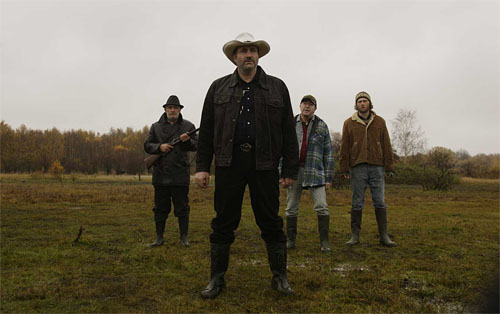
Films about small-town decline and despair share many hallmarks. No matter the setting, the themes and stories often are similar, with residents of blighted rural burgs living hapless lives against a crumbling backdrop of poverty and isolation, surviving on a familiar stoicism that barely masks their underlying frustration.
Thus, the brilliantly told story of Terribly Happy -- a Danish import that played Fantastic Fest 2009 and is back in Austin at the Arbor this week -- has a universal appeal, as it could have happened in any small town from the Australian Outback to the Texas Panhandle. A dark and sometimes darkly comic thriller set in a dreary town near Copenhagen, Terribly Happy has much in common -- in a good way, that is-- with other films about rural life: The locals mind each other's business more often than minding their own, have little use for big-city ways, and rely on their own brand of frontier justice and morality to sort out good and evil. Above all, they welcome outsiders with a mix of suspicion and hostility.
DVD Review: Bitch Slap
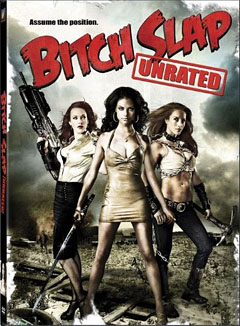 I had hoped that watching Bitch Slap
would let me get in touch with my inner Joe Bob Briggs, giving me a
good excuse to write a purposely lowbrow review of a purposely lowbrow exploitation film. After all, film critics have few
opportunities to include breast counts and phrases like "lesbian
bikini fu" in their reviews.
I had hoped that watching Bitch Slap
would let me get in touch with my inner Joe Bob Briggs, giving me a
good excuse to write a purposely lowbrow review of a purposely lowbrow exploitation film. After all, film critics have few
opportunities to include breast counts and phrases like "lesbian
bikini fu" in their reviews.
Sadly, Bitch Slap, now available on DVD, isn't the festival of guilty pleasures it should be. In many ways, it's an accurate homage to exploitation films; the film delivers plenty of impressively large cleavage, impressive (and even larger) weapons, cheap-thrill sexuality, and nonstop action awash in blood and blasted with pyrotechnics. But Bitch Slap also is accurate in the worst way: While it tries earnestly to be a campy send-up of a campy genre, it's mostly as dull and unsatisfying as the grindhouse schlock that inspired it.
At the outset, Bitch Slap looks promising. After an intriguing and funny opening credits montage of vintage exploitation film clips, the film opens with a scene of a battered, bleeding, scantily clad woman lying in a desert, surrounded by the fiery aftermath of a fierce battle. Everything about this scene and the ones that follow it -- from lingering cleavage shots to tough-girl dialogue -- instructs the audience to forget taking Bitch Slap seriously and just go along for what no doubt will be a mindlessly sexy and violent ride.

